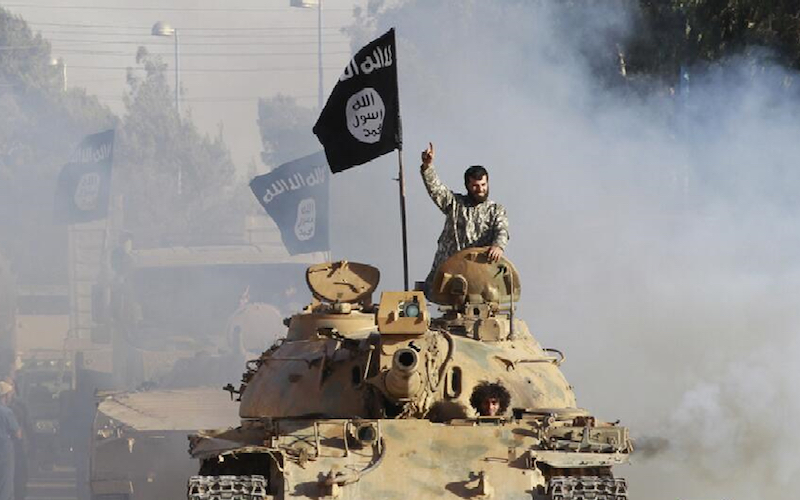
Obama’s ISIS Strategy Needs to Change
Fresh anxiety and diverging opinions over the recurring question of how best to defeat ISIS in Iraq and Syria have swept through conference rooms and offices for more than a week at the White House, Pentagon and State Department.
When media-phobic President Obama agrees to an on-the-record chat with a celebrated go-to influencer on Middle East policy it is a pretty good gauge of the intensity and breath of deliberations throughout the administration’s national security infrastructure. The number of times and variety of venues when Obama and his validators address the issue is another red flag.
Discussion and debate over strategy and tactics to counter ISIS certainly are not new exercises among President Obama’s defense, diplomatic and political advisers, including those who have the ear of the commander-in-chief, as well their deputies who are not in the room when decisions are made at the highest level.
While there are regular disagreements, it is important to note these differences of opinion over the coalition’s approach have not altered the core proposition in the administration that ISIS can and will be defeated. The consensus that victory will come for the coalition is maintained even during moments like we have seen this week when ISIS gained its latest geographic edge on the battlefield.
The president himself offered what sources insisted are an accurate depiction of the sentiment of his war council. “I don’t think we’re losing,” Obama said in an interview with The Atlantic published Thursday.
What differentiates this latest round of second-guessing administration policy is the juxtaposition of both an overwhelmingly successful special operations mission on a high-level ISIS target in Syria, followed only days later by the devastatingly disastrous defeat of Iraqi forces in Anbar Province and Syrian troops in Palmyra.
The daring Delta Force raid last weekend which took out the de facto finance minister Abu Sayyaf and a dozen other ISIS militants without the loss of a single American and the fall of Ramadi that sent an Iraqi garrison running for cover obviously represent glaringly opposite outcomes. Yet taken in tandem, both contrasting results have emboldened those in Washington, including some in the administration, who contend the U.S. should take a more overt role in ground missions.
A lack of confidence in Shiite-led Iraqi forces and the structural impediments to training and inserting Sunni forces into the fight against ISIS have been a routine point made by proponents of the U.S. taking more direct action in combat missions. The optics of an efficacious U.S. mission, like the commando operation deep in ISIS territory in Syria, however, is fresh ammunition for supporters of boots of the ground who are quietly taking an “I told you so” posture.
Obama and senior aides did their part to demonstrate how torn they are over how to react to the threat posed by ISIS. On Wednesday, the administration rolled out a senior U.S. official for a background briefing who went so far as to promise “In terms of taking back Ramadi, we’re going to help the Iraqis do it as soon as possible.”
Speaking to a handful of foreign policy reporters, the official conceded, “You’d have to be delusional not to take something like this and say ‘what went wrong, how do you fix it and how do we correct a course to go from here?’”
Declining to detail a specific course of action, the senior–level source added, “And that’s exactly what we’re doing. Taking an extremely hard look at it.”
Obama, meanwhile, in The Atlantic interview (conducted Tuesday, though published two days later) appeared to be unwilling to go as far as the U.S official in suggesting some change in policy could be a consequence of the latest swell of activity by ISIS.
Still maintaining that the conflict with ISIS is Iraq’s war, first and foremost, Obama told the magazine’s Jeffrey Goldberg, “if the Iraqis themselves are not willing or capable to arrive at the political accommodations necessary to govern, if they are not willing to fight for the security of their country, we cannot do that for them.”
The appearance that this is Iraq’s war, as the president maintains, is important to some of his political advisers who still see this as fulfilling the core promise to end the wars made to supporters who chose Obama over Hillary Clinton and John McCain. However, while nobody could have predicted the rise of ISIS in a post-Iraq occupation vacuum, or as an insidious outgrowth of the anti-despotic Arab Spring uprising across the Middle East, things have changed.
Wholesale deployment of U.S. forces in the field remains out of the question, but there may be more opportunities or specific missions for U.S. military commanders and forces to take a more conspicuous role on the ground against ISIS, according to Obama advisers.
Policies and plans are constantly under review, often dictated by the tenor and tempo of the situation on the ground, but White House spokesman Josh Earnest maintained this week “that the strategy that the President has laid out has enjoyed periods of progress and success,” and although “there have been areas of setback, too. That doesn’t mean that the strategy needs to be discarded.”
People in Washington who have been around Obama the longest nonetheless point out that as resolute as the president can appear to be, there have been instances when he can be persuaded to change strategy if faced with insurmountable odds. Scuttling Quixotic efforts by top aides to elevate Susan Rice to secretary of state and Larry Summers to chairman of the Federal Reserve are two such examples of a change of course that Obama grudgingly accepted.

